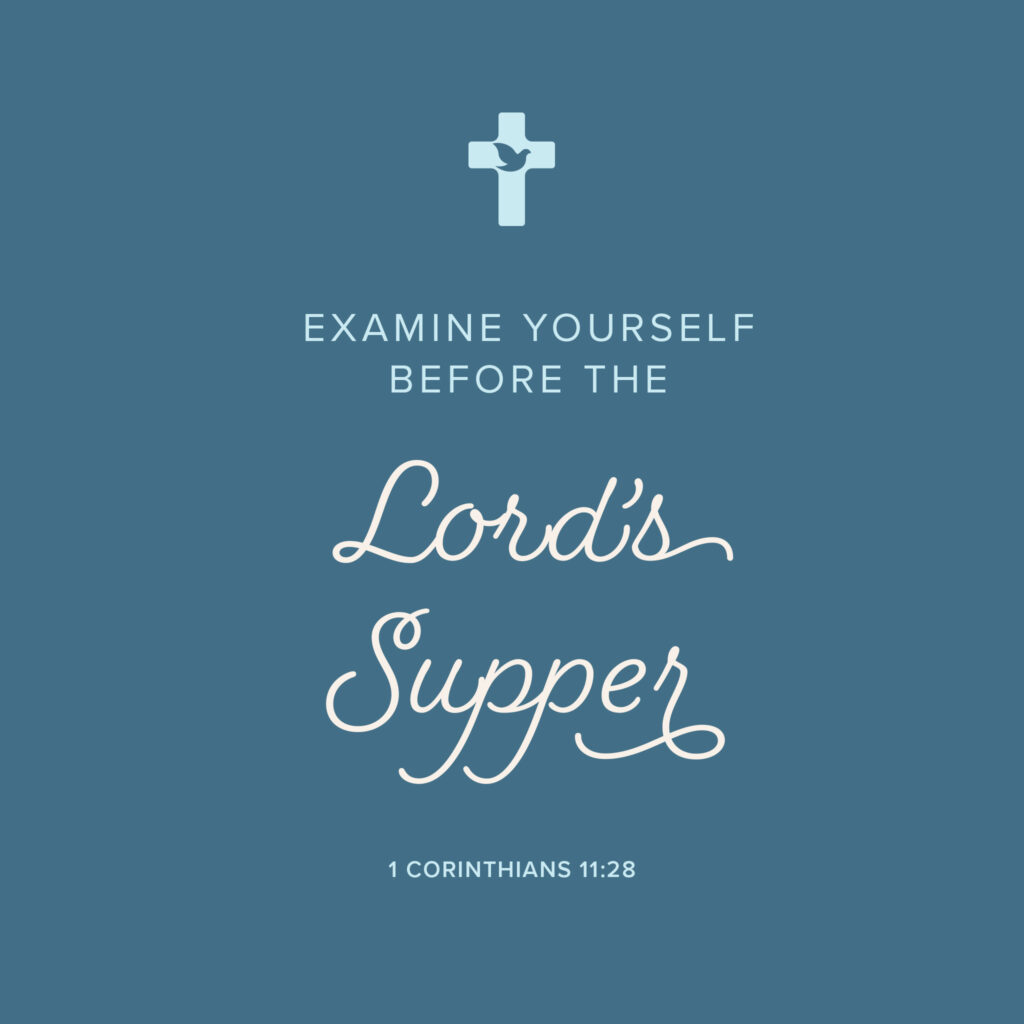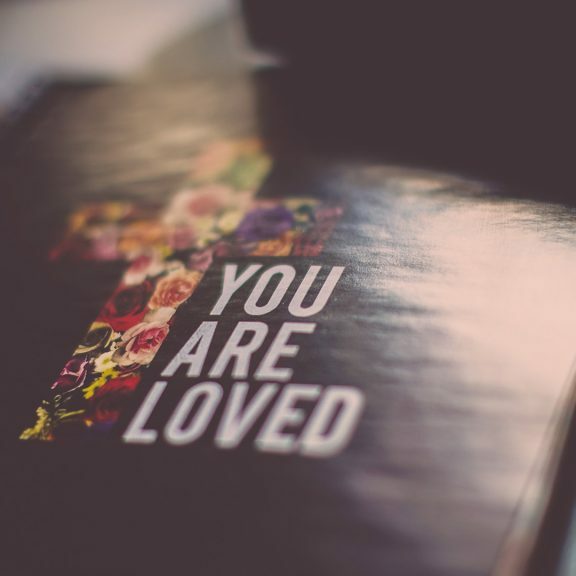April 6, 2023
Pastor Gunnar Ledermann
1 Corinthians 11:23-28
1 Corinthians 11:23-28
23 For I received from the Lord what I also passed on to you: The Lord Jesus, on the night he was betrayed, took bread, 24 and when he had given thanks, he broke it and said, “This is my body, which is for you; do this in remembrance of me.” 25 In the same way, after supper he took the cup, saying, “This cup is the new covenant in my blood; do this, whenever you drink it, in remembrance of me.” 26 For whenever you eat this bread and drink this cup, you proclaim the Lord’s death until he comes.
27 So then, whoever eats the bread or drinks the cup of the Lord in an unworthy manner will be guilty of sinning against the body and blood of the Lord. 28 Everyone ought to examine themselves before they eat of the bread and drink from the cup.
Growing up, we enjoyed a special meal on Easter. My mom would prepare a leg of lamb and serve it with mashed potatoes, gravy and green beans. Our family could have picked something else as our traditional meal or we could have eaten something random each Easter. Yet, having a special meal added to our joy as we celebrated the resurrection of our Savior.
Special meals and special events often go together. Jesus connected a special meal with a special event as well. Today we call it the Lord’s Supper because our Lord Jesus first celebrated it with his disciples on the night before he died, now called Maundy Thursday, or we call it communion because it unites us with God and with one another. In our Gospel reading from John 13, we are brought into the room where they first celebrated the Lord’s Supper. During the meal, we hear Jesus give a command, which is where we get the term “Maundy.” He told his disciples in John 13, 34 “A new command I give you: Love one another. As I have loved you, so you must love one another.” Jesus kept this command in many ways like washing the disciples’ feet just before he gave this command, and even by eating meals with people who often were not shown love as we read in Mark 2,
16 When the teachers of the law who were Pharisees saw him eating with the sinners and tax collectors, they asked his disciples: “Why does he eat with tax collectors and sinners?” 17 On hearing this, Jesus said to them, “It is not the healthy who need a doctor, but the sick. I have not come to call the righteous, but sinners.”
Mark 2: 16-17
Jesus loved people by serving and eating with them, which gave him the chance to share his promise to forgive their sins. Jesus’ greatest act of love was his sacrifice on the cross. Jesus commands you to love one another, and one way to love one another is to celebrate the Lord’s Supper together.
The Lord’s Supper revolves around love. In our New Testament reading from 1 Corinthians 11, the Apostle Paul explained the Lord’s Supper in a letter to the Christians in the Greek city of Corinth around twenty years after Jesus first celebrated it with the disciples. Paul’s authority to educate the Corinthians and all Christians who celebrate the Lord’s Supper is revealed in the opening line of 1 Corinthians 1, 1 Paul, called to be an apostle of Christ Jesus by the will of God. God called Paul to be on the same level as the twelve apostles of Jesus, who had witnessed the events of Jesus’ life and testified to what he did to save the world. Paul’s extensive, Pharisee level knowledge of the Old Testament also aided him in his ministry. In order to teach Christians how to celebrate the Lord’s Supper, Paul shared what the Lord Jesus told him,
23 For I received from the Lord what I also passed on to you: The Lord Jesus, on the night he was betrayed, took bread, 24 and when he had given thanks, he broke it and said, “This is my body, which is for you; do this in remembrance of me.” 25 In the same way, after supper he took the cup, saying, “This cup is the new covenant in my blood; do this, whenever you drink it, in remembrance of me.” 26 For whenever you eat this bread and drink this cup, you proclaim the Lord’s death until he comes.
1 Corinthians 11:23-26
Paul’s words match what the Gospel accounts of Matthew, Mark and Luke recorded about the Lord’s Supper. Paul then went on to teach the Corinthians how to prepare themselves to participate in the Lord’s Supper, 27 So then, whoever eats the bread or drinks the cup of the Lord in an unworthy manner will be guilty of sinning against the body and blood of the Lord. 28 Everyone ought to examine themselves before they eat of the bread and drink from the cup. Paul taught that Christians must examine themselves before participating. He also made it clear that participating in an unworthy manner is sin against the body and blood of the Lord. The Lord’s Supper revolves around the love of God to forgive our sins, but there are consequences for those who do not recognize his forgiveness through the body and blood.
The Corinthians were not preparing for the Lord’s Supper properly. They lacked repentant hearts and clear understanding. Instead, the wealthy were eating together privately, and the poor were being excluded, leading Paul to write, 21 As a result, one person remains hungry and another gets drunk. This brought about God’s discipline as we read in 1 Corinthians 11, 30 That is why many among you are weak and sick, and a number of you have fallen asleep. Weakness, sickness and even death were consequences in Corinth. This serves as a warning for us. When we approach the Lord’s Supper still holding onto sin, planning further sin or not recognizing the body and blood of the Lord, we are unworthy. Instead, we prepare for the Lord’s Supper by examining ourselves. We first apply God’s law to ourselves to see our sinfulness. One example, would be Jesus’ command in John 13, 34 “A new command I give you: Love one another.” When we each thing over the last few meals we have had, our lack of love, our sins and need for a Savior become so obvious. In the last few meals you have eaten there may have been arguments and lack of thanks, missed opportunities for prayer or encouraging classmates, coworkers, friends and family, even the amount or type of food you have eaten may not be taking care of the body God gave you in a good way or you are so consumed by eating just the right things in just the right amounts to have such a healthy body that your body image has become an idol. Just from the last few times you ate, you can see your lack of love, your sins and need for forgiveness. Taking the Lord’s Supper in an unworthy manner does not mean sinners are excluded from participating, but those unable to examine themselves. In love, God invites sinners to the Lord’s Supper for their forgiveness.
The new covenant is God’s forgiveness. Paul recorded Jesus giving us the new covenant in the Lord’s Supper in 1 Corinthians 11, 25 In the same way, after supper he took the cup, saying, “This cup is the new covenant in my blood; do this, whenever you drink it, in remembrance of me.” A covenant is an agreement. Often agreements are between two parties like in our Old Testament reading from Exodus 24, 8 Moses then took the blood, sprinkled it on the people and said, “This is the blood of the covenant that the Lord has made with you in accordance with all these words.” God had given Israel his laws and promised to bless them as long as they to kept them. Israel agreed to the terms of this covenant. Then, a sacrifice was made to take away their sins, and establish fellowship between God and Israel. Unfortunately, Israel went on to break the covenant with God leading to punishment. Thus, God established a new covenant. This new covenant did not depend on two parties, but one as we hear in Hebrews 9, 15 For this reason Christ is the mediator of a new covenant, that those who are called may receive the promised eternal inheritance—now that he has died as a ransom to set them free from the sins committed under the first covenant. Jesus is the one who kept the terms of the new covenant. He sacrificed his innocent life to free us from our sins giving us forgiveness and an eternal inheritance of life in heaven. When you eat and drink the Lord’s Supper, you receive Jesus’ body and blood for the forgiveness of all your sins. So then, the Lord’s Supper and the new covenant are about God’s love for you.
The Lord’s Supper is also about our love for one another. Examining ourselves before the Lord’s Supper is not just a tradition. Traditions come from people. Examining ourselves before the Lord’s Supper is commanded by God. We were taught by generations of Christians going back to Corinth and to the disciples who were commanded by Jesus. And we teach those who want to commune with us. When Christians take communion together, they become one body as Paul wrote in 1 Corinthians 10, 17 We, who are many, are one body, for we all partake of one loaf. As that one body, we want to agree on what examining ourselves means as well as the rest of our faith. And we learn about one another’s faith by asking and listening, and then comparing the answers to Scripture. And for those who agree on the clear truths, there is unity, like the unity described in Ephesians 4, 4 There is one body and one Spirit, just as you were called to one hope when you were called; 5 one Lord, one faith, one baptism; 6 one God and Father of all, who is over all and through all and in all. And where there is unity, there can be communion. On the other hand, if after asking, listening and going to Scripture, unity is not found, then it is not time for communion. When beliefs and teachings contrary to Scripture are discovered, it means more study and prayer are needed before declaring unity. When false teachings are tolerated for the sake of unity, the false teaching spreads as Paul wrote in Galatians 5, 9 “A little yeast works through the whole batch of dough.” When someone clings to a false teaching, then we must finally separate from them in spiritual matters like worship, prayer, communion, etc. as we read in Romans 16, 17 I urge you, brothers, to watch out for those who cause divisions and put obstacles in your way that are contrary to the teaching you have learned. Keep away from them. By God’s grace, we are here tonight because the Holy Spirit has united us by faith in our Savior and common understanding of Scripture. Together, we examine ourselves with the simple questions, am I sorry for my sins, do I trust in Jesus as my Savior, do I believe that Christ’s body and blood are present in the Lord’s Supper to assure me of forgiveness and do I intend, with God’s help, to live a more God-pleasing life?
Community is often celebrated with food. This evening, Jesus invites us to his table to eat the bread and his body, and to drink the cup and his blood. His new covenant is the forgiveness of sins, and he has established unity between God and his people. In John 13, Jesus said, 34 “A new command I give you: Love one another. As I have loved you, so you must love one another.” He loved us by sacrificing his body and blood on the cross to free us from sin. One way we love one another is celebrating the Lord’s Supper together. God wants you to examine yourself before the Lord’s Supper, so that you enjoy all the blessings of his love in the new covenant. Amen.




